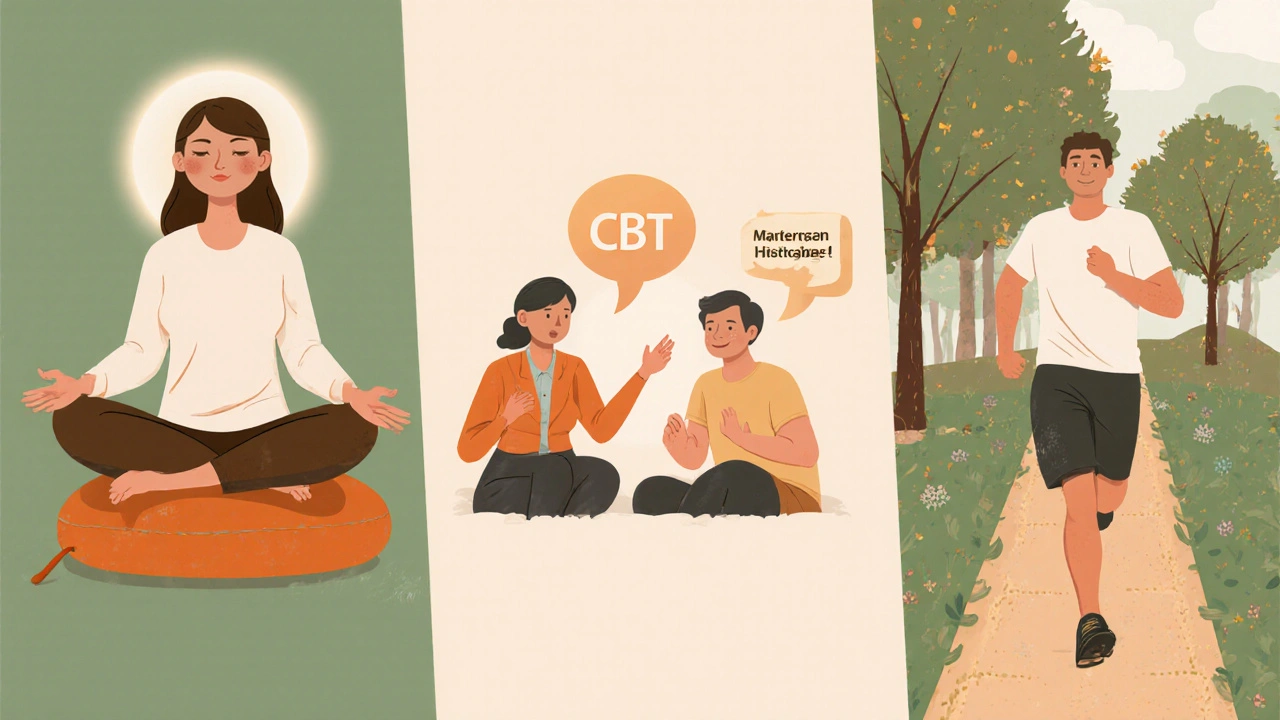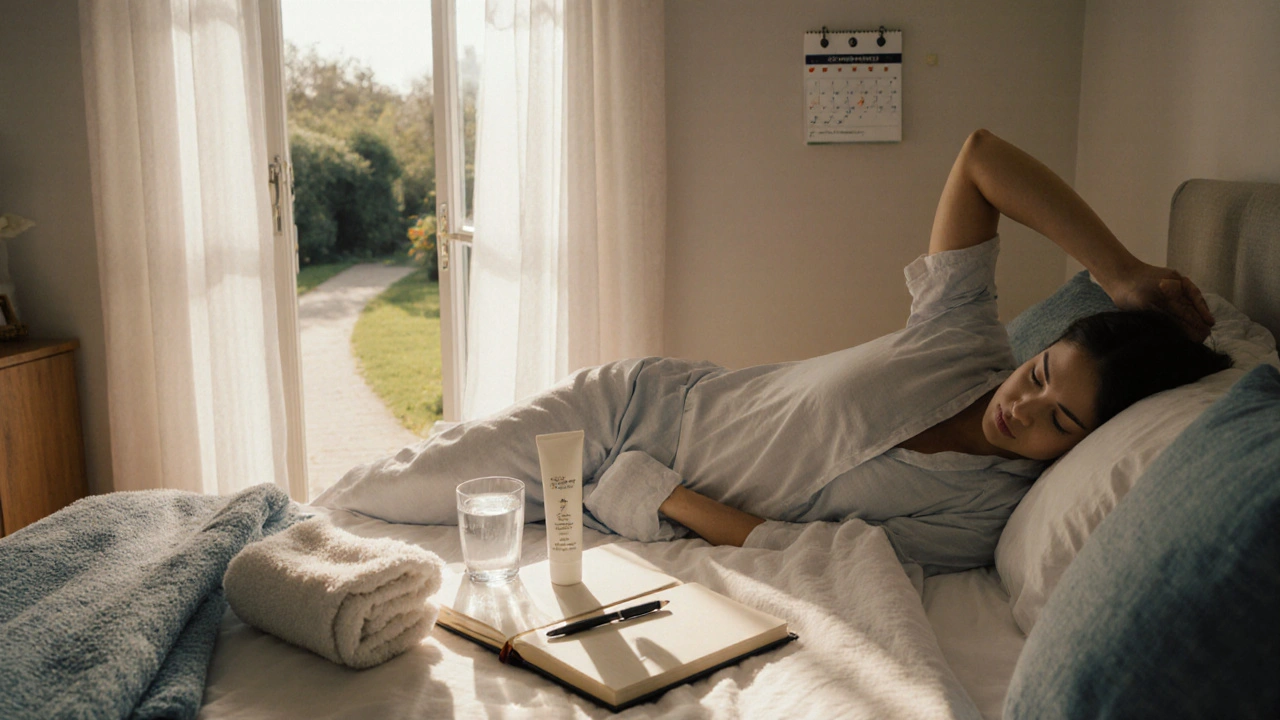Living with Psoriasis is a daily balancing act, and when stress tips the scales, the skin often pays the price. This guide explains why stress matters, how it fuels flare‑ups, and what you can do right now to keep both mind and skin calm.
Why Stress Matters for Psoriasis
Stress isn’t just a feeling; it’s a cascade of hormones that talk directly to your immune system. The primary stress hormone, Cortisol, spikes during anxious moments and can disrupt the skin’s natural barrier. In people with psoriasis, that disruption translates into faster cell turnover and thicker, inflamed plaques.
Immune system cells called T‑cells become over‑active under chronic stress, releasing inflammatory messengers that accelerate plaque formation. In short, stress fuels Inflammation, the core driver of psoriasis symptoms.
How Stress Triggers a Flare‑Up
When you experience a stressful event-tight deadline, argument, or even a noisy commute-your brain signals the adrenal glands to release cortisol. The surge does three things that matter for psoriasis:
- Weakens the skin barrier, letting irritants slip through.
- Promotes rapid skin cell growth, the hallmark of plaque buildup.
- Elevates inflammatory cytokines (like IL‑17 and TNF‑α) that keep plaques inflamed.
Research from 2023 shows that patients who score high on the Perceived Stress Scale have 30% more frequent flare‑ups than low‑stress counterparts. The link is clear: the more your mind races, the more your skin reacts.
Measuring the Stress‑Psoriasis Connection
Before you can tame stress, you need to see how it shows up in your body. Simple tools include:
- Stress diary: Log events, sleep quality, and skin changes for two weeks. Patterns emerge fast.
- Heart‑rate variability (HRV) apps: Lower HRV often signals chronic stress.
- Blood tests: Levels of C‑reactive protein (CRP) can flag systemic inflammation linked to stress.
Combining these data points helps you pinpoint which stressors are most damaging, making it easier to target them.

Practical Stress‑Management Techniques
Below are evidence‑backed strategies that directly cut down cortisol and calm the immune system.
| Technique | Time Commitment | Evidence Level for Psoriasis | Main Benefit |
|---|---|---|---|
| Mindfulness | 10‑15min/day | Strong (randomized trials show 20% reduction in PASI scores) | Lowers cortisol, improves sleep |
| Cognitive Behavioral Therapy (CBT) | Weekly 60‑min sessions | Moderate (clinical studies report fewer flare‑ups) | Reframes stressors, builds coping skills |
| Exercise (moderate intensity) | 30min, 3‑5×/week | Strong (reduces IL‑17 levels) | Boosts endorphins, improves skin barrier |
| Yoga / TaiChi | 20‑30min, 2‑3×/week | Moderate (pilot studies show symptom relief) | Combines movement and breath control |
Pick one or two that fit your schedule and stick with them for at least six weeks before judging the impact.
Mind‑Body Practices That Work
Mindfulness meditation trains the brain to notice stress without spiraling. A simple 5‑minute body scan each morning can lower cortisol by up to 15% within a month.
For those who prefer structure, Cognitive Behavioral Therapy (CBT) teaches you to identify negative thought patterns that amplify stress. Online CBT platforms often offer a free introductory module-worth trying before committing to a therapist.
Movement matters too. Moderate‑intensity cardio (like brisk walking) releases endorphins that counteract stress hormones. If joint pain is an issue, low‑impact options such as swimming or cycling keep the blood flowing without aggravating skin lesions.
Lifestyle Tweaks That Support Skin Health
Beyond direct stress reduction, certain habits reinforce a healthier skin barrier:
- Sleep hygiene: Aim for 7‑9hours. Poor sleep spikes cortisol and delays skin repair.
- Balanced diet: Omega‑3 rich foods (salmon, flaxseed) lower systemic inflammation. Limit alcohol and sugary drinks, which can trigger flare‑ups.
- Hydration: Drinking at least 2liters of water daily helps maintain skin elasticity.
- Skin care routine: Use fragrance‑free moisturizers right after bathing to lock in moisture.
These tweaks may not replace medical therapy, but they create a supportive environment for any prescribed treatment.

When to Call a Dermatologist
If your diary shows that stress‑related flare‑ups are frequent (more than once a month) or your plaques are spreading rapidly, it’s time to seek professional help. Dermatologists can adjust topical regimens, prescribe systemic medications, or recommend phototherapy. Mention your stress‑tracking results; many clinicians incorporate stress‑management into an overall care plan.
In cases where stress is overwhelming, a referral to a mental‑health specialist-preferably one experienced with chronic skin conditions-can make a big difference. Integrated care models, where a dermatologist and therapist collaborate, have shown up to a 35% improvement in patient‑reported quality of life.
Quick Checklist: Reduce Stress‑Induced Psoriasis Flare‑Ups
- Start a 2‑week stress diary to spot triggers.
- Practice 10minutes of mindfulness daily.
- Schedule three 30‑minute walks each week.
- Limit caffeine after 2PM to improve sleep.
- Apply fragrance‑free moisturizer within three minutes of showering.
- Book a dermatologist visit if flare‑ups exceed once a month.
Frequently Asked Questions
Can stress really cause psoriasis to start?
Stress alone rarely initiates psoriasis, but it can accelerate the onset in genetically predisposed people. The hormone cascade lowers skin defenses, making the first plaques appear sooner.
How quickly will mindfulness lower my flare‑up frequency?
Most beginners notice a modest drop in stress levels after two weeks, and clinical studies report a measurable reduction in flare‑ups after about six weeks of consistent practice.
Is exercise safe during an active psoriasis flare?
Yes, as long as the activity doesn’t cause sweating that irritates plaques. Low‑impact options like swimming or using a stationary bike are ideal.
Do over‑the‑counter supplements help with stress‑related psoriasis?
Omega‑3 fish oil and vitamin D have modest anti‑inflammatory effects, but they work best when paired with proven stress‑reduction techniques and prescription therapy.
When should I consider therapy for stress management?
If you notice that stress is chronically high (daily scores above 7 on a 10‑point scale) or if you’re feeling hopeless about controlling flare‑ups, a therapist can provide tools that directly lower cortisol and improve skin outcomes.


15 Comments
i totally get how stress can mess with your skin, i try keep a little diary and it really helped me spot that my work deadlines make my plaques flare up.
just a heads up, a quick 5‑minute breathing exercise before a meeting can calm the nerves and maybe keep the skin calmer too.
Ah, the noble art of breathing-how utterly groundbreaking. It’s almost as if we’ve discovered fire all over again, isn’t it? Yet, amidst the melodrama of cortisol storms, one must ask whether mindfulness truly outshines a well‑timed espresso in the grand theatre of inflammation. Perhaps the real tragedy lies in our collective neglect of the psyche while we slap on creams like armor.
While anecdotal evidence is plentiful, the literature lacks robust randomized data confirming the efficacy of brief breathing exercises in psoriasis management.
Stress, as elucidated in contemporary psychoneuroimmunology, serves as a potent modulator of cutaneous homeostasis, influencing both innate and adaptive immune pathways.
Elevated cortisol levels precipitate a disruption of the epidermal barrier, thereby facilitating transepidermal water loss and heightened antigenic exposure.
Concomitantly, the upregulation of Th17 cells and the subsequent release of interleukin‑17 amplify keratinocyte proliferation, manifesting clinically as psoriatic plaques.
Empirical investigations conducted in 2022 and 2023 have demonstrated a statistically significant correlation between perceived stress scores and PASI (Psoriasis Area and Severity Index) elevations.
Moreover, heart‑rate variability analyses reveal that diminished autonomic flexibility is predictive of flare‑up frequency.
In light of these findings, a multimodal approach integrating psychological interventions with pharmacotherapy is warranted.
Mindfulness‑based stress reduction (MBSR) programs, when administered over a six‑week period, have shown a mean reduction of 20 % in PASI scores across diversified cohorts.
Cognitive‑behavioral therapy (CBT) further equips patients with cognitive restructuring techniques that attenuate maladaptive rumination.
Exercise, particularly moderate‑intensity aerobic activity, exerts anti‑inflammatory effects via the enhancement of endogenous endorphin release and the modulation of cytokine profiles.
Yoga and Tai Chi, as embodied movement practices, simultaneously address somatic tension and respiratory patterns, contributing to autonomic equilibrium.
Dietary considerations, including the augmentation of omega‑3 fatty acids, complement these strategies by attenuating systemic inflammation.
Sleep hygiene, encompassing a consistent circadian schedule and the avoidance of stimulants, is indispensable, as nocturnal cortisol surges are implicated in barrier compromise.
Patients are encouraged to maintain a bi‑daily log documenting stressors, sleep quality, and cutaneous manifestations to facilitate pattern recognition.
Healthcare providers should incorporate these patient‑generated data points into clinical decision‑making, thereby fostering a collaborative therapeutic alliance.
Ultimately, the synergistic integration of stress mitigation techniques with conventional dermatological treatments holds promise for reducing disease burden and enhancing quality of life.
It is truly disheartening to observe individuals neglecting the profound responsibility they bear toward their own bodies, especially when the scientific community has furnished ample guidance on stress management.
One cannot simply excuse repeated flare‑ups by citing “busy schedules” without earnest introspection.
Neglecting sleep, indulging in excessive caffeine, and overlooking basic mindfulness practices betray a disregard for self‑care that borders on moral failure.
Consider the ethical implications of imposing a genetic predisposition narrative that absolves personal agency; such fatalism undermines the very essence of proactive health stewardship.
Patients who prioritize trivial pursuits over evidence‑based interventions inevitably perpetuate their own suffering, as well as that of their caregivers.
It is incumbent upon each individual to adopt the recommended lifestyle modifications with unwavering commitment.
Only through disciplined adherence can the theoretical benefits outlined in peer‑reviewed literature translate into tangible clinical improvement.
Therefore, I implore anyone reading this to reflect deeply on their daily choices and act accordingly.
Ah, the tragic chorus of self‑neglect! In the grand saga of skin and soul, we are but actors caught in a storm of cortisol, raging like a tempestuous sea.
Yet, fear not, brave wanderer, for within you lies the quiet lighthouse of mindfulness, waiting to pierce the dark clouds of anxiety.
Embrace the sunrise of breath, let the rhythm of your heart steady the tide, and watch the plaques recede like distant horizons.
First off, kudos for diving into the science behind stress and psoriasis-understanding the connection is half the battle.
One practical tip: start a simple stress diary, jotting down moments of heightened anxiety, sleep quality, and any changes in your skin within 24 hours.
Over a two‑week span, patterns often emerge, highlighting the triggers that are most disruptive for you.
Pair this with a consistent mindfulness routine; even five minutes of guided meditation each morning has been shown to cut cortisol by roughly 15 % in clinical studies.
In addition, moderate cardio-think brisk walking or cycling-for 30 minutes, three times a week, can lower IL‑17 levels, directly targeting the inflammatory pathway driving plaques.
Don’t overlook nutrition: incorporating omega‑3 rich foods such as salmon or flaxseed can further dampen systemic inflammation.
Lastly, if you notice flare‑ups exceeding once a month despite these measures, schedule an appointment with your dermatologist and discuss integrated care options, possibly including CBT or phototherapy.
Remember, you’re not alone in this journey, and a multifaceted approach often yields the best results.
That diary hack really works-just scribble notes and watch the pattern emerge.
Across cultures, the mind‑body nexus has long been recognized; ancient Ayurvedic texts speak of “vata” imbalance manifesting as skin irritation, akin to our modern understanding of stress‑induced inflammation.
Thus, integrating traditional mindfulness practices with contemporary dermatological care offers a harmonious pathway.
I’ve noticed that many of my patients from diverse backgrounds respond well to incorporating brief pranayama sessions into their daily routine.
Even a three‑minute alternate nostril breathing exercise can activate parasympathetic tone, which may help stabilize cortisol spikes.
It would be interesting to see a cross‑cultural study comparing the efficacy of such techniques across different patient populations.
Great points, everyone! Just a reminder to apply fragrance‑free moisturizer right after showering-locking in moisture can really boost barrier repair.
From a pathophysiological standpoint, the epidermal barrier dysfunction observed during acute stress episodes is mediated by glucocorticoid‑induced suppression of filaggrin expression, leading to increased transepidermal water loss and subsequent antigenic exposure.
Targeted interventions aimed at modulating the hypothalamic‑pituitary‑adrenal axis, such as low‑dose melatonin supplementation, may therefore represent adjunctive therapeutic avenues worth exploring.
Honestly, nothing beats a good ol’ American‑made jog around the park to clear the head and get the blood pumping-helps both the skin and the spirit.
yeah sure stress is the villain but what about the diet i mean we all know sugar spikes can ignite plaques too maybe we’re just looking for an easy scapegoat
It is commendable that you are proactively seeking strategies to manage stress‑related psoriasis flare‑ups; such initiative often translates into measurable health improvements.
Consider establishing a structured weekly schedule that allocates specific time slots for mindfulness meditation, physical activity, and adequate sleep.
Consistency in these practices not only fortifies the skin barrier but also cultivates psychological resilience, thereby diminishing the frequency and severity of outbreaks.
Engaging with a support network-whether through patient groups or trusted friends-can provide additional motivation and accountability.
Remember, incremental progress accumulates over time, and each positive habit contributes to a more robust quality of life.
Write a comment